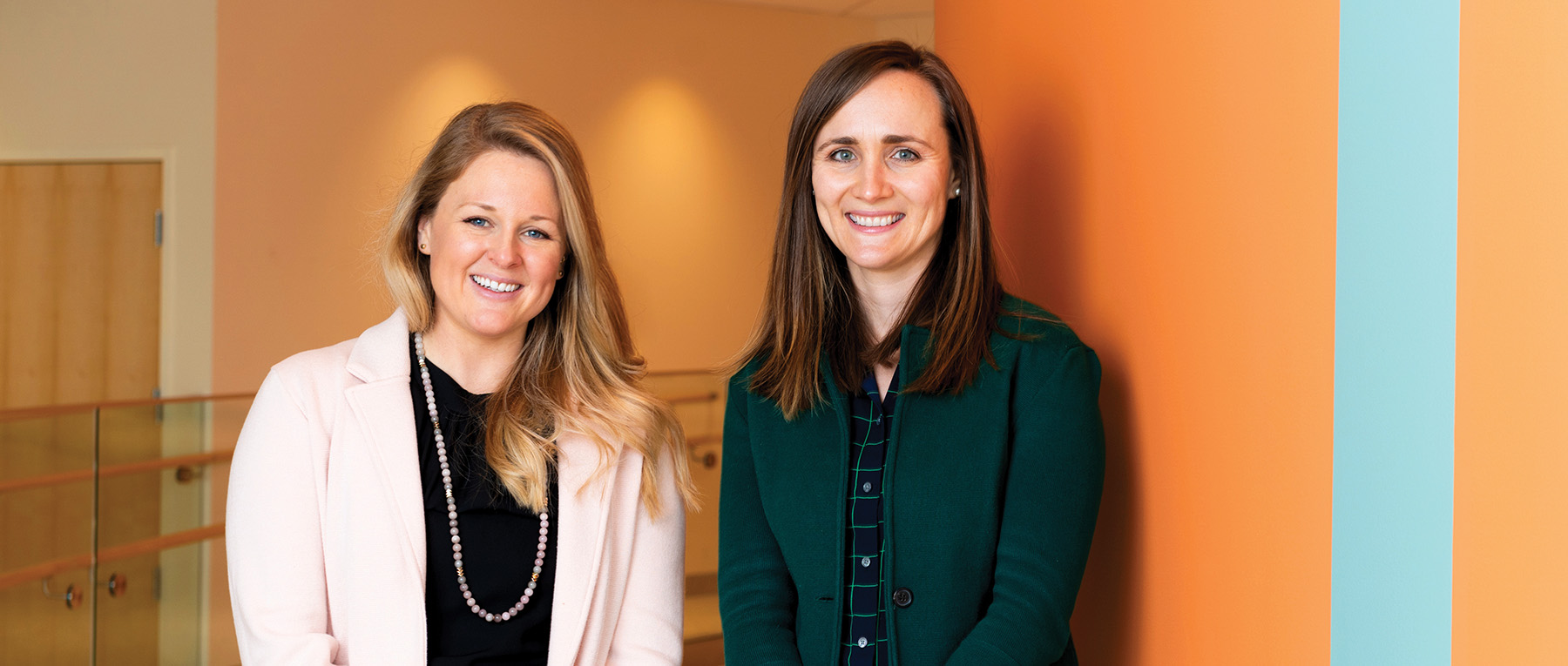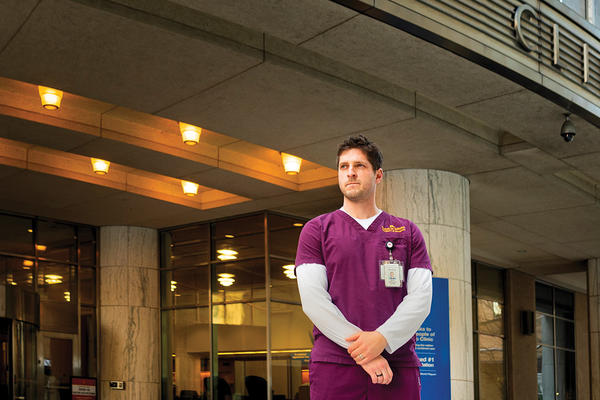Passion for the continuation of care
Taking Charge of Your Survivorship helps patients and caregivers after life-altering medical treatments
April 4, 2021
Steve Rudolph

Maureen (Mo) Anderson, DNP, RN, and Megan Voss, DNP, RN, want the public and nursing students to know that nursing isn’t just done within a hospital setting.
Integrative nurse clinicians at University of Minnesota Masonic Children’s Hospital, Anderson and Voss have seen the challenges patients face when sent home, no longer able to access the hospital’s services. They’ve also heard from patients and families on the lengthy struggles that can follow a life-saving cancer treatment.
“Megan and I have heard patients and family members say it’s really hard to leave the hospital,” says Anderson. “A lot of families have said that living in this state is harder than living through the diagnosis and the treatment phases because during that everything is mapped out. You’re just told what to do. You’re really just trying to survive.”
Voss adds that patients and family members often do not have a concept for just how difficult survivorship is until they find themselves there.
“You expect survivorship to be this period of relief and calm and normalcy,” says Voss. “Instead, you’re living with fear and anxiety, you’re lost, you’re picking up pieces, you’re exhausted, and you may have all these other physical side effects that are lingering. It goes on and on.”
Anderson and Voss believe they have a moral and ethical responsibility to provide their patients (and those of others) with the necessary resources for their wellbeing and their emotional and mental health after they have left the hospital and throughout their journey.
Constantly scrambling to recreate this continuity of care as their patients returned to their homes all around the country and the world, they set out to develop a repository people can come to for their wellbeing needs and for community.
Taking Charge of Your Survivorship
Last December, after more than two years of extensive needs assessment and individual interviews with patients, families, clinicians and focus groups the pair launched Taking Charge of Your Survivorship.
The website, at www.takingcharge.csh.umn.edu/survivorship, is a combination of evidence-based health and wellbeing advice balanced with the lived experiences of adolescents and young adults who have survived cancer or other rare genetic and metabolic disorders. Anderson and Voss view the site as a living, breathing organism that will change as the needs of their patients change. New rare diseases, experimental protocols and a patient population that changes over time create a constant need for new additions and voices.
Taking Charge of Your Survivorship is modeled after the Earl E. Bakken Center for Spirituality & Healing’s popular Taking Charge of Your Health & Wellbeing. Anderson and Voss, who are both faculty at the center, credit their colleagues and the center’s team for guidance and help with content.
The site’s development was funded by a gift from the Children’s Cancer Research Fund (CCRF) who has made survivorship a priority with research advances helping so many more patients survive, but often with lasting effects.
“When they go back home, they just don’t have the access to those services that might be more readily available in the Twin Cities and especially in the hospital,” says Haivy Thompson, vice president of mission and marketing for CCRF.
“The fact that they can now leverage those things that they learned and take advantage of some of these things on their own,” says Thompson, “I think that means a lot to patients because they feel equipped to do these things that they’ve really come to appreciate during their treatment.”
A connection with integrative health and healing
For both Anderson and Voss, a website empowering their patients post-treatment is an extension of their own lifelong efforts to care for themselves.
Voss, a fourth generation nurse, was ready to quit the profession after her first year in oncology. While contemplating a switch to anything that would keep her from having to deal with death and dying, she started getting into different aspects of integrative health as a method of survival.
During her search for information, she discovered the University was launching a Doctor of Nursing Practice (DNP) degree in integrative health and healing. The more she read about the new program, the more she knew what her next step would be.
“These are all the things I’m doing to survive while I’m trying to get out of nursing, but the University of Minnesota is saying these things belong in nursing,” says Voss, who joined the School of Nursing’s first class in 2009. “Practicing integrative nursing helped remove some of the moral distress that I was feeling early on in my career and made me feel empowered and taught me how to empower my patients.”
Anderson’s initial interest in integrative health sprung from a realization that she kept seeing the same patients as a pediatric ER nurse.
“I was a pretty new nurse and not understanding why we weren’t doing more to help them,” says Anderson. “Standard care was to diagnose then discharge, not to do more education.”
A Type 1 diabetic for more than 20 years, Anderson had learned how important education and daily practices were to helping her maintain her own health. Coupled with the experiences she would later gain as a home care case manager in Minneapolis, she knew integrative nursing could be the way of helping others take a vested interest in their bodies, minds and spirits and take care better care of themselves.
During the process of applying for the DNP program, its director Mary Jo Kreitzer, PhD, RN, FAAN, told her about one of her students who was starting a pediatric program at Masonic Children’s.
“Megan and I met to start talking about peds and integrative nursing and how those two can collide,” says Anderson.
Focus on creating community and caregivers
Ten years after being diagnosed with Fanconi anemia and undergoing a bone marrow transplant and numerous cancers, Sean Breininger is grateful for a resource like Taking Charge of Your Survivorship.
“The website is another arm in the relationship that’s holding my hand and guiding me through the steps,” says Breininger. “I’m a patient one year out and I’m a patient 10 years out. They are providing fresh content for us as we continue our journey.”
Allison Breininger, Sean’s wife, thinks one of the gifts of the website is the acknowledgement of the lifelong component of being a survivor. She is also appreciative that it lifts up the often overlooked role of the caregiver and provides content for them, something she advocates for in her work at The Negative Space.
“For every person and every patient, there’s at least one caregiver,” says Allison Breininger. “They need acknowledgement and they need support and they need services as well.”
Allison Breininger, a frequent contributor to Taking Charge of Your Survivorship, thinks Anderson and Voss can be leaders and teachers to hospitals as their model reflects what an integrative health program should look like.
“I think people often just see the body part they are in charge of,” she adds. “They see the whole person and the whole family. They’ve brought that into the website and are looking for what’s missing and trying to fill that gap.”
Update: Since publication of this story, Megan Voss has joined the School of Nursing as a clinical associate professor and continues to be an associate professor in the Bakken Center for Spirituality & Healing.

